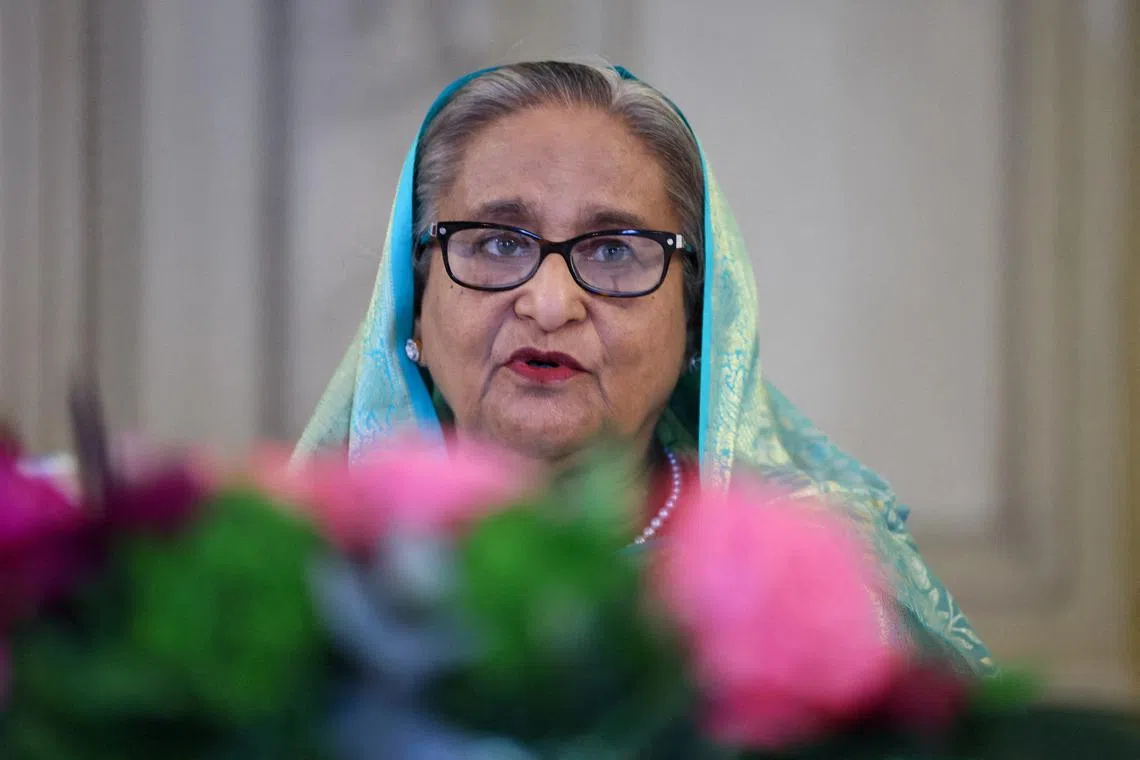US lawmakers call for sanctions on Bangladeshi officials over rights abuses
Sign up now: Get insights on Asia's fast-moving developments

Bangladesh's former prime minister Sheikh Hasina is accused of using excessive force to quell student-led protests, a charge she denies.
PHOTO: REUTERS
WASHINGTON - Some lawmakers in the US Congress have called for sanctions on Bangladeshi officials under Ms Sheikh Hasina, who recently quit as prime minister and fled,
An interim government, led by Nobel Peace laureate Muhammad Yunus, was sworn in on Aug 8, with the aim of holding elections.
Bangladesh was engulfed by demonstrations and violence after student protests in July against quotas that reserved a high portion of government jobs for certain groups. The demonstrations escalated into a campaign to oust Ms Hasina, who won a fourth straight term in January in an election which the opposition boycotted and which the US State Department said was neither free nor fair.
Ms Hasina’s exit came after at least 300 people, many of them students, were killed in a crackdown on demonstrations.
“The Bangladeshi leaders who orchestrated this brutal crackdown must be held accountable, which is why we’re calling upon the administration to sanction General Secretary Quader and Home Affairs Minister Khan, as we continue working to support a peaceful and democratic Bangladesh,” said Senator Chris Van Hollen, a Democratic member of the US Senate Foreign Relations Committee.
The lawmaker was referring to Mr Asaduzzaman Khan Kamal, who was Ms Hasina’s home minister, and Mr Obaidul Quader, who was the general secretary of her Awami League party.
A letter by Mr Van Hollen and five other congressional Democrats was sent to US Secretary of State Antony Blinken and Treasury Secretary Janet Yellen, calling for sanctions on those officials. The State Department said it did not preview sanction-related actions.
Mr Blinken said separately on social media: “I welcome the swearing-in of Dr Muhammad Yunus to lead the interim government in Bangladesh. The United States supports his call for calm and peace.”
Human rights groups have accused Ms Hasina of using excessive force against protesters, a charge she denies.
Since her departure, the student protests have widened to demand the exit of more officials appointed from her time in office.
Ms Hasina fled to New Delhi after leaving Bangladesh, ending her uninterrupted rule of 15 years in the nation of 170 million people.
Her fall triggered both jubilation and violence. Her official residence was attacked, her father’s statues were brought down, and attacks were reported against minorities.
Ms Hasina’s father Sheikh Mujibur Rahman was the first president of Bangladesh and himself a former prime minister. REUTERS


